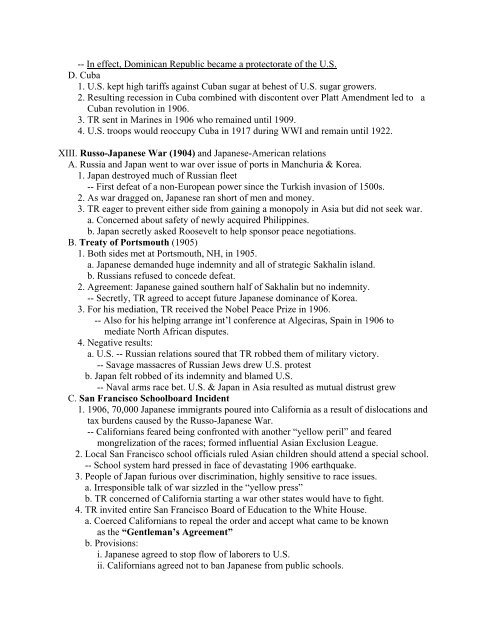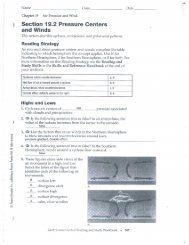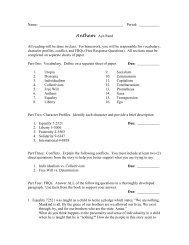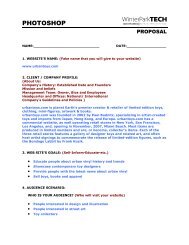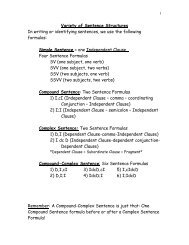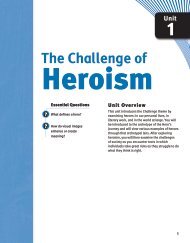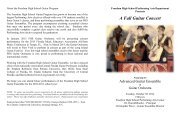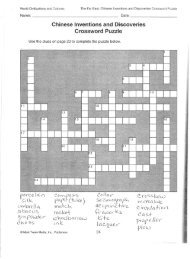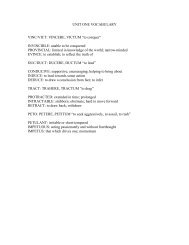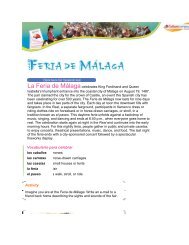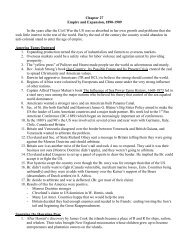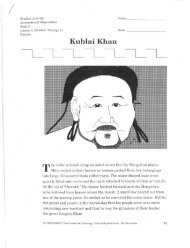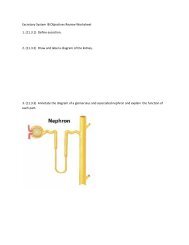Imperialism Notes 1890-1913
Imperialism Notes 1890-1913
Imperialism Notes 1890-1913
You also want an ePaper? Increase the reach of your titles
YUMPU automatically turns print PDFs into web optimized ePapers that Google loves.
-- In effect, Dominican Republic became a protectorate of the U.S.<br />
D. Cuba<br />
1. U.S. kept high tariffs against Cuban sugar at behest of U.S. sugar growers.<br />
2. Resulting recession in Cuba combined with discontent over Platt Amendment led to a<br />
Cuban revolution in 1906.<br />
3. TR sent in Marines in 1906 who remained until 1909.<br />
4. U.S. troops would reoccupy Cuba in 1917 during WWI and remain until 1922.<br />
XIII. Russo-Japanese War (1904) and Japanese-American relations<br />
A. Russia and Japan went to war over issue of ports in Manchuria & Korea.<br />
1. Japan destroyed much of Russian fleet<br />
-- First defeat of a non-European power since the Turkish invasion of 1500s.<br />
2. As war dragged on, Japanese ran short of men and money.<br />
3. TR eager to prevent either side from gaining a monopoly in Asia but did not seek war.<br />
a. Concerned about safety of newly acquired Philippines.<br />
b. Japan secretly asked Roosevelt to help sponsor peace negotiations.<br />
B. Treaty of Portsmouth (1905)<br />
1. Both sides met at Portsmouth, NH, in 1905.<br />
a. Japanese demanded huge indemnity and all of strategic Sakhalin island.<br />
b. Russians refused to concede defeat.<br />
2. Agreement: Japanese gained southern half of Sakhalin but no indemnity.<br />
-- Secretly, TR agreed to accept future Japanese dominance of Korea.<br />
3. For his mediation, TR received the Nobel Peace Prize in 1906.<br />
-- Also for his helping arrange int’l conference at Algeciras, Spain in 1906 to<br />
mediate North African disputes.<br />
4. Negative results:<br />
a. U.S. -- Russian relations soured that TR robbed them of military victory.<br />
-- Savage massacres of Russian Jews drew U.S. protest<br />
b. Japan felt robbed of its indemnity and blamed U.S.<br />
-- Naval arms race bet. U.S. & Japan in Asia resulted as mutual distrust grew<br />
C. San Francisco Schoolboard Incident<br />
1. 1906, 70,000 Japanese immigrants poured into California as a result of dislocations and<br />
tax burdens caused by the Russo-Japanese War.<br />
-- Californians feared being confronted with another “yellow peril” and feared<br />
mongrelization of the races; formed influential Asian Exclusion League.<br />
2. Local San Francisco school officials ruled Asian children should attend a special school.<br />
-- School system hard pressed in face of devastating 1906 earthquake.<br />
3. People of Japan furious over discrimination, highly sensitive to race issues.<br />
a. Irresponsible talk of war sizzled in the “yellow press”<br />
b. TR concerned of California starting a war other states would have to fight.<br />
4. TR invited entire San Francisco Board of Education to the White House.<br />
a. Coerced Californians to repeal the order and accept what came to be known<br />
as the “Gentleman’s Agreement”<br />
b. Provisions:<br />
i. Japanese agreed to stop flow of laborers to U.S.<br />
ii. Californians agreed not to ban Japanese from public schools.


